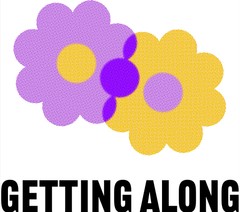Getting Along is a column about taking care of yourself, setting boundaries, and having difficult conversations, for people who struggle with all three.
Advertisement
So often, the red flags begin waving in conversations about dating. Maybe it’s a lot of casual references to “crazy” exes, or the way they hit on literally all of your friends. Perhaps they refuse to do any self-reflection—e.g., “What about me might be putting potential romantic partners off?” “Do the people I’m physically attracted to seem to actually share my values, and how is that affecting my relationships?”—when things don’t work out. Maybe they perform self-awareness with regard to misogyny, but don’t actually ever seem to change their shitty behavior, or they claim to want to date someone smart, but sure do get defensive when said smart women have strong opinions that are different from their own, or when women criticize them in general. Or perhaps the instances in which they acknowledge their own privilege or say they “just really want to meet someone smart and settle down” are well matched by the amount of inscrutable “jokes” they make that seem, upon further inspection, not terribly funny and definitely kind of sexist. The reality that seemingly “woke,” seemingly nice people can also be misogynists is fairly well-established, but that doesn’t make it any easier to deal with when it’s happening in your friend group. If you have the nagging feeling that someone you know is not actually the feminist they claim to be and you aren’t sure how to deal, here are some things to try.
Advertisement
Don’t let them use irony as an excuse.
Advertisement
Know that visible allyship can often be a convenient cover for bad behavior.
Pay closer attention to how they talk about women, and be willing to challenge their version of events.
Advertisement
- “Hm, I don’t think it’s totally fair to say she’s acting ‘crazy’ or putting too much pressure on you. If I was dating someone who did [thing they just described doing], I’d be pretty upset too.”
- “I’m not sure what you’re describing is her leading you on, to be honest… it just seems like friendly behavior to me.”
- “Hm, have you asked her what she [wants/thinks/needs]?”
- “I mean, it kind of seems like she’s doing [thing they don’t like] because you’re doing [thing they think is totally fine and not a problem at all].”
- “Dude, what you’re describing is really [intense/over-the-top] behavior on your part, and I’d be [creeped out/pissed/annoyed/not returning your calls] if I were her too.”
- “Hmm, I don’t think the situation is actually that confusing, to be honest… it kind of sounds like she’s just not that into you.”
Advertisement
Call out nasty comments in the moment.
- “I’m sorry, what?” followed by, “Are you saying that [what they are implying, in plainer terms]?”
- “What do you mean by that?”—a good option if you’re not 100 percent sure that they are saying the awful thing it seems like they are saying.
- “Yikes” or “Ouch”—good for when your head is about to explode and you need a moment to collect your thoughts.
- [No verbal response, just a face that very clearly connotes “wow, what a deeply not-OK thing to say.”]
Be direct about the problems their behavior is causing.
- “The way you kept badgering Lou when she clearly didn’t think you were being funny and wanted you to stop was really shitty, and, frankly, put a huge damper on what should have been a fun weekend.”
- “I don’t know if you realize it or not, but you are getting a reputation as someone who doesn’t respect women—and, honestly, given [things they have been doing], I can see why that is.”
- “I have to be honest, [behavior] is making me not want to hang out with you as much.”
- “I’m at the point where I worry about introducing my other friends to you, and I’ve started to wonder if I should warn them in advance about you, which is not a position I want to be in with a friend. I really need you to hear me and to cut it the fuck out.”
Advertisement
I also think it’s worth naming the bad behavior in really specific terms instead of relying on euphemisms to communicate what you’re upset about. There’s a huge difference between being circumspect and saying “what you did the other night” and saying “when you groped Harper’s ass the other night.” Your tiptoeing around the unsettling reality of what is happening doesn’t help anyone but the person causing harm. If the situation has reached a point where you worry that they are going to embarrass you in some way or feel the need to warn people about them… that’s a problem! At the very least, you should do what you can to stop subjecting yourself and your other friends to their behavior, or letting them use their proximity to you as a sign that they must be an OK dude. This is a great time to familiarize yourself with the Geek Social Fallacies (which identifies common friend group myths like “ostracizing anyone ever is evil” and “criticizing a friend under any circumstances is a betrayal”) and the Missing Stair (a really helpful framework for thinking about the lengths we often go to to avoid dealing with bad behavior). I learned about both of these from the wonderful Captain Awkward, who has a lot of great advice on the topic of creepy behavior in all sorts of very specific scenarios, starting with this post, which I highly recommend reading! Whether or not you tell them they are no longer invited depends on the circumstances—if it’s a standing or more formal invite, if they are asking directly to be invited or for your friend’s phone number, etc.—and sometimes it makes sense to simply pull away. But if you know in your heart you need to say something, or if they ask you directly about the situation, be kind but still honest. That might sound like…
Stop inviting them to events and introducing them to your friends.
- “The truth is, the way you talk about [women/sex/dating] makes me really uncomfortable and I didn’t want to have to deal with that [this weekend/at book club/anymore].”
- “If I can be honest, the way you’ve talked about [women/sex/dating] makes me really wary of setting you up with anyone, let alone a close friend of mine.”
- “Hey—I think it might be best if you don’t join in the game night this weekend as planned. The past few times, you’ve [things they did] and it wasn’t fun for a lot of folks, myself included. I hope we can eventually get back to a place where I can trust you more, and where everyone feels more comfortable having you around, but I think that’s going to take some time.”

